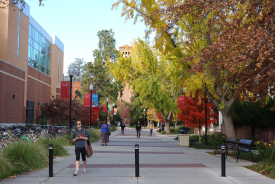The Office of Sustainability and Tiger Dining at the Auburn University have banned Styrofoam cups from private vendors on campus to establish a sustainable dining experience and promote ecological awareness.
"We want to make dining on campus more sustainable," said Glenn Loughridge, director of Campus Dining.
As a result, private vendors like Chick-fil-A sell food and beverages in paper cups to students instead of foam plastic cups and other foam plastic serving items. Styrofoam is the most recognizable brand of foam-plastic serving items.
"We researched the cost first and saw it was possible to become a Styrofoam-free campus. Now private vendors such as Chick-fil-A have a paper cup available for students," Senior Executive Chef of Auburn University Emil Topel said.
Michael Kensler, director of Campus Sustainability, said that Tiger Dining's decision to create a Styrofoam-free campus highlights its commitment to sustainability. "When all costs of Styrofoam to public health and the environment are included, the benefits of this move far outweigh the costs," Kensler said in a statement.
Topel said that the transformation from Styrofoam products to paper products will cost only $5,000 per year. The change will not affect student dining plans or costs of meals for private vendors on campus.
The University officials said that paper waste can be converted into mulch and other useful alternatives, but Styrofoam does not break down completely. Plus, Styrofoam does not break down in a trash bin as well as paper. As a result, more trash bags are required to dispose the waste.
"Once you recycle paper, it goes from waste to a resource. If we don't recycle, then we are just actively being wasteful," Kensler said. "By eliminating waste, landfills don't get full as fast, which is good because there is no such thing as a safe landfill."
Kensler said that elimination of Styrofoam is one of the measures taken towards creating zero waste and sustainable campus. Campus Kitchens collaborates with Tiger Dining to use the uneaten food from campus dining operations to feed the needy in local communities.
"Composting is secondary to feeding people," Loughridge said. "If we can recycle or compost waste, that's better than throwing it in the trash, but ultimately our highest purpose is feeding hungry people."
© 2025 University Herald, All rights reserved. Do not reproduce without permission.








